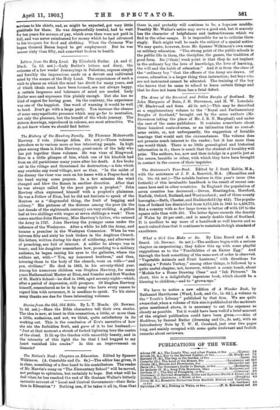The History of the Hawtrey Family. By Florence Molesworth Hawtrey.
2 vols. (George Allen. 21s. net.)—These volumes introduce us to various more or less interesting people. In high place among them is John Hawtrey, great-uncle of the lady who has put together these volumes. He was vicar of Ringwood. Here is a little glimpse of him, which one of his kinsfolk had from an old parishioner many years after his death. A fire broke out in the village and threatened its destruction,—a fate which may overtake any rural village, now as then. "In the midst of the dismay the vicar was seen on his knees with a Prayer-book in his hand saying some prayers. In a few minutes the wind changed and blew the flames in another direction. After that he was always called by the poor people a prophet." John Hawtrey often expressed himself with a prophet's plainness. He was a Fellow of Eton, iaut he did not hesitate to speak of the Montem as a "disgraceful thing, the fruit of begging and robbery." His pictures of the distress among the poor (in the last decade of the eighteenth century) are very striking. A gallon loaf at two shillings with wages at seven shillings a week ! Then comes another John Hawtrey, Miss Ilawtrey's father, who entered the Army in 1797. John Hawtrey the younger came under the influence of the Wesleyans. After a while he left the Army, and became a preacher in the Wesleyan Connexion. When he was between fifty and sixty he took Orders in the Anglican Church. His letters, written during his days of soldiering, and afterwards of preaching, are full of interest. A soldier he always was in heart; and his daughter remembers how, preaching to a military audience, he began raising his eyes to the galleries, where the soldiers sat, with—" You, my honoured brethren," and then, lowering them to the body of the church, went on with—" and you, civilians." He died in 1853, in his seventy-third year. Among his numerous children was Stephen Hawtrey, for many years Mathematical Master at Eton, and founder and first Warden of St. Mark's School—he died in 1886, aged seventy-eight—which, after a period of depression, still prospers. Of Stephen Hawtrey himself, remembered as he is by many who have every reason to regard him with reverence, it is needless to speak. To his sister many thanks are due for these interesting volumes.






































 Previous page
Previous page